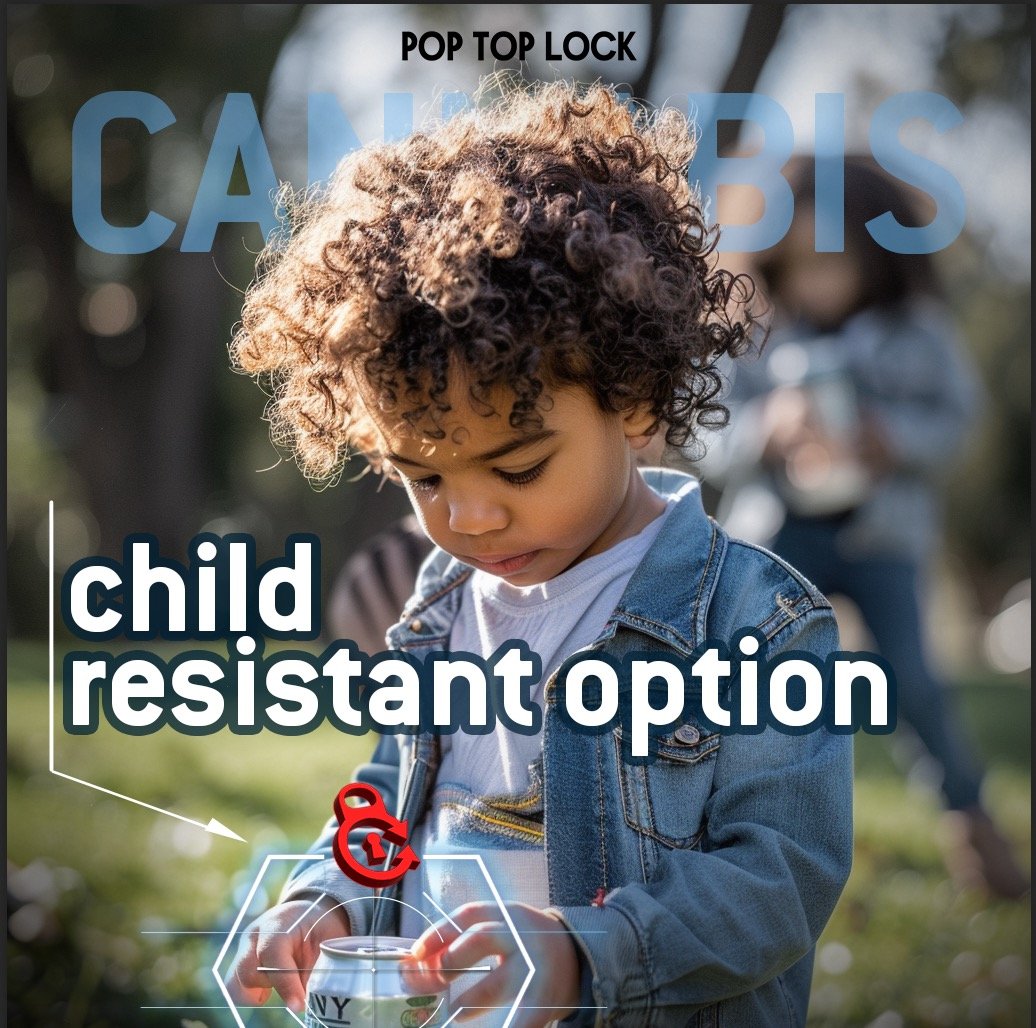Cannabis Infused Drinks
State & Federal packaging requirements
CANNABIS
§C15413 “(b) A package containing cannabis goods shall be tamper-evident and child-resistant. If the package contains multiple servings, the package must also be resealable.”
Cannabis-infused beverages are growing rapidly and are expected to reach over $2 billion in annual sales by 2026.
Protecting children
Keep margins high & lower your COG
User friendly
Add to a sustainable planet
Zero clunky Plastic closure or components
Double Edge Seam
Stackable
Compliant with State & Federal laws
Cannabis Brands want
cost-effective, all-aluminum options.
Pop Top Lock delivers.
Why do THC Infused Drinks use a expensive plastic closure?…
That’s all there is… until Pop Top Lock.
Currently, there is no other all-aluminum SOT can end that is 100% fully recyclable and meets the federal and state requirements for Cannabis drinks; child-resistant, tamper-evident, and reclosable.
Cannabis beverage makers are forced to use costly plastic CR/TE ends due to a lack of alternatives, compromising their sustainability goals. These plastic closures increase environmental waste and risk valuable aluminum being lost, as some recycling facilities reject cans with plastic components. With the cannabis-infused drink market expanding rapidly, this issue is only becoming more urgent.
Pop Top Lock Cannabis design finally gives Manufacturers the choice to use fully recyclable cans that have a cheeper MSRP and they help lower plastic into the environment - becoming part of the solution to plastic that winds up in landfils or the ocean.
The Problem with Mixed-Material Packaging
Recycling facilities are primarily designed to process single-material items. When materials like plastic and aluminum are fused together, they become difficult to separate efficiently. This complexity often leads facilities to divert such items to landfills rather than attempt costly separation processes.
For instance, Tetra Pak cartons consist of approximately 75% paperboard, 20% plastic, and 5% aluminum. While the paper component is recyclable, the bonded plastic and aluminum layers, known as poly-aluminum, are challenging to process and frequently end up as waste.
Previously developed resealable cans often incorporated plastic components in their closures, further complicating recyclability and reducing the likelihood that they’ll be recovered in standard aluminum recycling streams.

The global cannabis market was ~$57 billion USD in 2024 and is projected to grow at a compound annual rate of roughly 15%, reaching ~$115–120 billion USD by 2030.
Pop Top Lock's goal is to expand into other applications beyond beverages, that need a Child-Resistant, tamper-evident, and resealable closure to replace plastic.

Pop Top Lock is a global solution
for sustainable packaging the cannabis industry to
reduce plastic pollution,
stop unnecessary aluminum waste,
save millions, eventually billions of dollars in aluminum loss,
and reduce manufacturing production costs.
*Promote Recycling and Lower Brand COG*
Recycling aluminum helps stabilize the wholesale price of cans by reducing reliance on newly mined material, avoiding issues like the aluminum shortage that occurred during the COVID-19 pandemic in 2020, when demand for canned beverages surged and supply chains were disrupted. Recycling also reduces unnecessary CO₂ emissions and the high costs associated with mining virgin aluminum.
The demand for aluminum continues to grow, particularly in the beverage sector. THC-infused drink sales are projected to grow globally at a CAGR of 5.6% through 2026, and SkyQuest projects the aluminum can market will reach $87.1 billion by 2030.
To maintain healthy profit margins, beverage brands must ensure a steady, cost-effective aluminum supply. Recycling supports this by reinforcing the circular economy and strengthening manufacturers’ bottom lines—ultimately keeping costs of goods lower for suppliers and producers alike.







